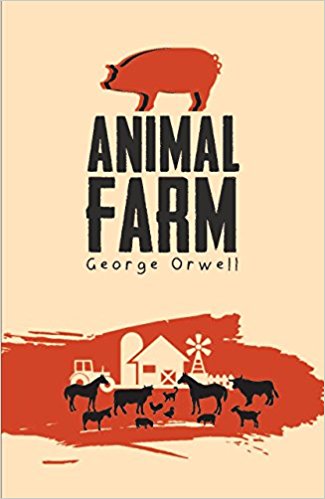By Sabiha Tafader
The novella Animal Farm by George Orwell implies that apathy towards education leads to a crippling lack of knowledge. The novella Fahrenheit 451 by Ray Bradbury suggests that when there is a lack of interest and concern for education, it creates conditions that invite governmental dictatorships where citizens are tightly controlled and forbidden from questioning authority. In both these classic works of fiction, the authors stress the importance of education because apathy towards education puts people more at the mercy of their leaders, and promotes a dangerous lack of independent thinking.
In dystopian societies like those described by Orwell and Bradbury, citizens withdraw from reality, making themselves oblivious to their surroundings. In eerie anticipation of today’s audience-driven talent shows, and “reality” TV, Fahrenheit 451‘s Mildred Montag is obsessed with her interactive TV shows.
She would listen to broadcasts from the parlor walls and their local radio station. On page 69 it states: “Mildred kicked at a book. Books aren’t people and besides if Captain Beatty knew those books … he might come and burn the house … Think of our investment.”
This scene shows that Mildred is concerned about her governmental leader, and that she is afraid to go against the law. Since Mildred is apathetic towards education, she believes her money to be more significant than education. In addition, we see that Mildred lacks psychological insight because she has attempted to commit suicide. On Page 17 Mildred’s husband says: “‘You took all the pills in your bottle last night.’” When she responds, “ ‘Heck, what would I want to go and do silly thing like that for?’” this indirectly shows that Mildred lives a despairing life. It also indicates that she lacks the insight to understand and accept her flaws.
Hopelessness is often a byproduct of uneducated minds. In Animal Farm. Boxer, a strong cart horse, lacks the ability to think as an individual; thus he blindly supports Napoleon through every circumstance. On page 61 we are given his two slogans, “I would work harder” and “Napoleon is always right.” These phrases indicate Boxer’s personality.
Orwell used these slogans to reveal that Boxer didn’t think for himself. Just like the other animals, he went along with imposed rules and blindly obeyed the law. This indicates that the animals were helpless, because they were uneducated.
Near the ending of the book on pages 122 and 123, we are shown how Boxer’s inability to read contributes to his early demise. He is portrayed totally unaware of a sign on a truck revealing who has actually come to get him:
“…’Horse Slaughterer and Glue Boiler’….All the animals took up the cry of ‘Get out!’ The time had been when a few kicks from Boxer’s hoofs would have smashed the van to matchwood. But alas! His strength had left him.”
Thus, by being apathetic towards education, and being blindly loyal to a deceptive leader, Boxer passively entered a truck taking him to a slaughterhouse. By the time others alerted him to the danger, it was too late for Boxer to make his way out of the van.
Unjust governments often create laws to punish citizens unjustly for supposed crimes. In Animal Farm, after the death of Mr. Jones, the pigs moved into the farmhouse and Napoleon becomes a leader. On At one point Orwell states: “Napoleon was now never spoken of simply as Napoleon. He was always referred to in formal style as ‘our leader, Comrade Napoleon’.” Giving Napoleon this formal title emphasizes that he is now in power, and that the animals must respect him as an authority figure.
Under the rule of Napoleon the animals were all under his control, and he used lies and propaganda to deflect blame from himself by creating a scapegoat. Orwell writes: “Whenever anything went wrong it became usual to attribute it to Snowball.” This means that Snowball was blamed for every bad thing that occurred after he was expelled by Napoleon, so that the other animals would never trust Snowball to rule. Since the animals did not think independently, most of them simply chose to obey the orders of their leader.
Similarly, in Fahrenheit 451, the military captured an innocent man to use as a scapegoat to satisfy their audience. On page 141 Bradbury describes how this is done. “We’ve watched the chased…The chase is still running. The other way, though.” Further on he adds: “So they‘re sniffing for a scapegoat to end things with a bang…“, and finally—“ victim was seized by the hound…”.
This scene in the book reveals how the police were saving themselves from the embarrassment of Montag’s escape. Since the citizens were uneducated and lacked knowledge about their surroundings, they trusted things as they were presented to them by authority figures and news media. They didn’t bother, nor have the right, to question their leaders.
Despite the differences between both novels, they convey a similar message about how people are treated under dictatorships.
Nowadays, the way we view education has drastically changed and improved from years before. This can be proven by the number and diversity of jobs we have in the United States. For instance when students are apathetic towards education, the resulting in being absent from school countless times, government officials and the school counselor take action. This way students are at least able to graduate and or get jobs.
In both novels the author shows the significance of having the right to be educated and that education should be under our control. Education is so crucial to our future it should be easily accessible to all, instead of controlled or restricted by authority figures.


